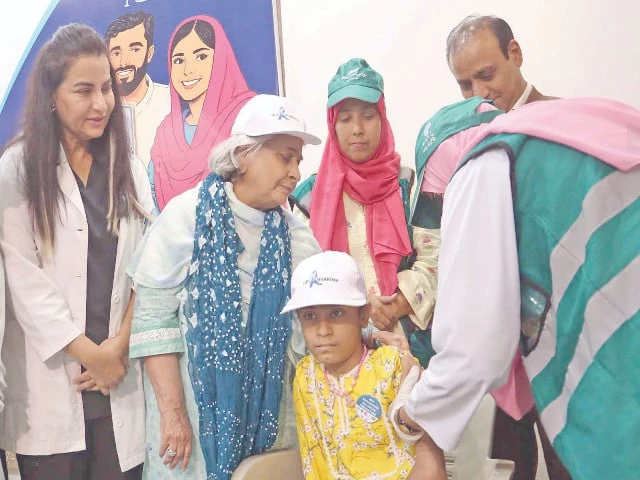The Human Papilloma Vaccination campaign in Karachi and the rest of Sindh has spread for three days. During the 12 -day campaign, 59% of eligible girls were vaccinated, while the sessions will continue in schools to cover the remaining 41%. Mobile teams have also received instructions to continue with recovery activities.
The Human Papilloma Vaccination Campaign (HPV) was held from September 15 to 27, the unique vaccination campaign established an objective of 395,609 girls. Of these, 307,421 were vaccinated.
According to a letter issued by the Director of the Expanded Immunization Program for Sindh (EPI), Dr. Raj Kumar, 59% of the directed girls received the vaccine in the first 12 days. To achieve the established objective, the Department of Health of Sindh has extended the campaign from September 29 (today) until October 1. A special approach will be given to the union councils where a greater number of girls remains without vaccination.
School sessions will continue in areas where coverage is less than 80% or where the equipment has not yet reached. It has been aimed at field teams and supervisors to participate in recovery activities without any additional budget. The Education Department will continue to improve school access.
The attached commissioners will supervise the recovery activities at the district level. Social leaders, teachers, parents and religious academics will participate in awareness sessions to increase public support and vaccine confidence. Civil society organizations will help expand community scope. Health centers and district authorities will also maintain adequate records of used vaccines.
The vaccine promotes the results left much to be desired, with rumors and false information that hinder the objective number established by government institutions. The Ministry of Health must be praised by the efforts made to combat this propaganda. The campaign was based on pediatricians, gynecologists and first -line workers to inform communities about HPV and cervical cancer prevention.
Read: The shot you fear: HPV vaccine and the uphill battle
However, the numbers achieved by the vaccine campaign could not match government expectations. The campaign concluded, achieving 77.1% of its goal. Despite the trip, almost 89,000 girls could not be vaccinated due to parents’ negative, the absence of home or school and disease.
The HPV vaccine campaign has been involved in controversy since its inception. Political leaders are spreading false propaganda in this regard, which has led many parents to prevent thousands of children from receiving the shot.
False rumors had become so powerful that the upper members of the government, such as The Federal Minister of Health, Mustafa Kamal, publicly vaccinated her daughter to dissipate rumors and erroneous information about the antichth obtaining vaccine, saying that the vaccine is safe and essential to protect future generations. “To counteract this deceptive narrative, I have had my own daughter, Raja Kamal, vaccinated in front of the media to show that there is nothing to fear,” he added.
He helped, but not for much. The parents criticized their doors to health workers and some schools closed for days for false statements that cause infertility.
The popular leader of a right -wing religious party, Rashid Mehmood Soomro, said the voluntary vaccine was being forced to girls by the government. “Actually, our daughters are being infertile,” he told a manifestation in Karachi.
Read more: Sindh displays the HPV vaccine that addresses the technical, non -social gaps
These statements echo many of the inaccurate narratives linked to the polyomyelitis vaccine unit. In the 2010s. This infertility propaganda had accumulated the Polyomyelitis vaccine campaign, which led to the National Foundation for Research and Development (NRDF) to have to publish a statement that addresses false information. Pakistan is one of the last two countries in the world, along with Afghanistan, where polyomyelitis remains endemic, despite global efforts to eradicate the virus.
The conspiracy theory that vaccines produced by the West are used to stop the Muslim population for the first time during the polio campaign, and is now witnessing a resurgence with the beginning of the VPP Vaccine Unit.
“Some people have refused, they have closed their doors and even hid information about their daughter’s age,” said the Ambreen Zehra vaccine to the AFP while heading from door to door in a lower average income neighborhood in Karachi.
Pakistan’s relationship with vaccines has been tumultuous, to say at least. Pakistan is currently the second largest country with the largest number of children with zero doses of vaccines in southern Asia, being number one in India. A study by British Medical Journal Lancet found that Pakistan had 419,000 children who fell in that category of zero vaccine.




